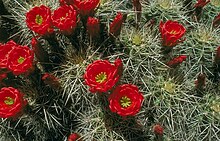Echinocereus triglochidiatus
| Echinocereus triglochidiatus | |
|---|---|
 |
|
| Scientific classification | |
| Kingdom: | Plantae |
| (unranked): | Angiosperms |
| (unranked): | Eudicots |
| (unranked): | Core eudicots |
| Order: | Caryophyllales |
| Family: | Cactaceae |
| Subfamily: | Cactoideae |
| Tribe: | Pachycereeae |
| Genus: | Echinocereus |
| Species: | E. triglochidiatus |
| Binomial name | |
|
Echinocereus triglochidiatus Engelm. |
|
| Synonyms | |
|
Echinocereus mojavensis |
|
Echinocereus mojavensis
Echinocereus triglochidiatus is a species of hedgehog cactus known by several common names, including kingcup cactus, claretcup, and Mojave mound cactus. This cactus is native to the southwestern United States and northern Mexico, where it is a resident of varied habitats from low desert to rocky slopes, scrub, and mountain woodland. It is most abundant in shady areas.
There are a number of varieties of this highly variable cactus species, but not all are universally recognized. In general it is a mounding cactus, forming bulbous piles of few to hundreds of spherical to cylindrical stems. It is densely spiny and somewhat woolly. The showy flower is a funnel shaped bloom up to 8 or 9 centimeters wide and bright scarlet red to orange-red tepals. There is a thick nectar chamber and many thready pink stamens at the center of the corolla. The flowers are pollinated by hummingbirds.
One variety, var. arizonicus, is federally listed as an endangered species in the United States. It is limited to the intersection of Arizona and New Mexico in the United States with Mexico. This variety is sometimes included within Echinocereus coccineus.
The conservation status of several subspecies differs from that displayed. Examples include:
Presumably the specific epithet comes from and , with a meaning of having three arrow points.
...
Wikipedia

